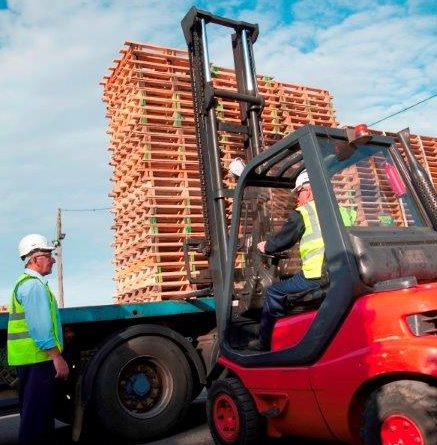
Progressive businesses committed to sustainability are looking to their pallet supply chain to deliver better value. Simply supplying a quality, new timber pallet is no longer enough to satisfy customer expectations.
Volume pallet users in particular, in sectors such as construction, packaging and chemical are increasingly looking to a circular economy business model that focuses on “make – use – remake” as opposed to “make – use – dispose”. There is a recognition that everything has value and nothing should be wasted, including timber pallets. Making things last and improving resource efficiency is now understood to go hand in hand with increasing profitability.
In a circular economy, the ultimate goal is to keep products and materials circulating in a high-value state of use for as long as possible to maximise resources. This is achieved by designing products smartly with their whole life cycle in mind, re-using and repairing to extend their useful life, and then when their life is deemed over, remanufacturing or recycling to create new products from old.
As global timber costs have risen throughout 2017 and into 2018, timber availability has also become a potential threat to supply security for some buyers. Interest in pallet recovery, remanufacture and reuse is growing. For customers whose products don’t always fit neatly onto a standard 4 way entry 1200×1000 or 1200×800 pallet footprint the potential to reuse has been limited. Bespoke pallet designs are seen as a barrier to traditional pallet pooling models.
As the UK largest pallet manufacturing group Scott Pallets and HLC (Part of the Scott Group), were quick to recognise this growing interest in circular business practice and rather than viewing it as a threat to its established pallet manufacturing business, chose to invest in the development of a national pallet recovery and reuse service to meet this shifting paradigm.
As a certified manufacturer, committed to meeting customer preferences, timber is sourced from sustainably managed forests and certified sawmills. Timber volumes are forecast using an integrated ERP system to minimise raw material waste and underpin quality management.
Close collaboration between customers and the in-house technical support team builds on a shared recognition of the inherent value of the raw material and the desire to avoid waste. The importance of good design is key to the principle of circularity and has proven invaluable in guiding buyers to make informed decisions in relation to extending pallet life cycle potential, safe working loads and logistic optimisation. Our experienced designers, using the TIMCON endorsed Pallet Design System (PDS) developed by Virginia Tech, achieve the balance between the best use of raw materials to manage cost, safety and life cycle criteria.
Sourcing mindfully, designing innovatively and manufacturing to high quality standards underpins the potential to reuse timber pallets.
Customers value this support and the collaborative working style that has become a key part of this award winning service (Edie Award 2016, Ethical Corporation – Responsible Business Award 2016). https://www.scottgroupltd.com/news/casestudy/bq/
In contrast to traditional pooling solutions, Scott Pallets’ recovery service has evolved to reflect the diversity in their customers’ pallets and their associated supply chains. Understanding the relationships between their customers’ supply chains has been a challenge which has required real commitment to getting it right. Cathy Morio, Scott Pallets’ Commercial Manager is responsible for leading the service development and co-ordinating pallet collections, inspections and remanufacture ahead of supply for re-use. Cathy explains “only by working collaboratively with our customers have we been able to develop a model that stands up environmentally and commercially.” Customers’ own pallets are efficiently recovered from housebuilders, contractors, distributors, retailers and end users via a national network of logistic partners. https://www.scottgroupltd.com/pallets/pallet-recovery/#supplychain
Tightly controlled repair procedures ensure pallets supplied for re-use perform under load to consistently meet expected safety standards, without compromise. Pallets that are eventually deemed beyond remanufacture are recycled into products such as animal bedding, sheet board material, playground surfacing, garden mulch and cat litter.
Since its launch in 2008 the sustainable pallet solution offer has evolved year on year and now provides customers with a fully managed, national solution that supports their environmental and sustainability aspirations and commitments. In 2017 over 1.2 million pallets were recovered for reuse which equates to 21,600 tonnes of timber diverted from landfill. The equivalent of 33,744 tonnes of CO2 absorbed!
Managing all aspects of pallet supply, service delivery and management reporting is part of the increasingly sophisticated, broader skill set required of a well-equipped Key Account Manager. Robert Blaikie, Head of Sales believes that “servitisation is something that customers increasingly value and is therefore prioritised in Scott’s staff development and recruitment objectives”.
Thinking differently about the way timber pallets are supplied and used is an ongoing passion for the Scott Group that is celebrating its 30th year. Alan Gibson MD explained “being prepared to change is a hallmark of Scott’s readiness to future proof by adapting to a rapidly shifting business environment, which increasingly embraces circular economy principles”.